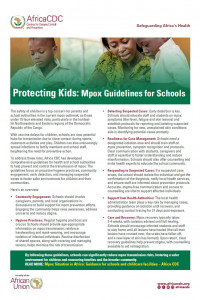The safety of children is a top concern for parents and school authorities in the current mpox outbreak, as those under 15 face elevated risks, particularly in the hardest-hit Northwestern and Eastern regions of the Democratic Republic of the Congo.
With vaccine delays for children, schools are now potential hubs for transmission due to close contact during sports, classroom activities and play. Children can also unknowingly spread infections to family members and school staff, heightening the need for preventive action.
To address these risks, Africa CDC has developed comprehensive guidelines for health and school authorities to help prevent and control the transmission of mpox. The guidelines focus on proactive hygiene practices, community engagement, early detection, and managing suspected cases to foster safer environments for children and their communities.
Here’s an overview:
• Community Engagement: Schools should involve caregivers, parents, and local organisations in discussions to build support for mpox prevention efforts. Engaging the community helps raise awareness, address concerns and reduce stigma.
• Hygiene Practices: Regular hygiene practices are crucial. Schools should provide age-appropriate information on mpox transmission, reinforce handwashing and mask-wearing, and encourage isolation of infected individuals. Routine disinfection of shared spaces, along with covering and managing lesions, helps minimise the risk of transmission.
• Detecting Suspected Cases: Early detection is key. Schools should educate staff and students on mpox symptoms (like fever, fatigue and skin lesions) and establish protocols for reporting and isolating suspected cases. Monitoring for new, unexplained skin conditions aids in identifying potential cases promptly.
